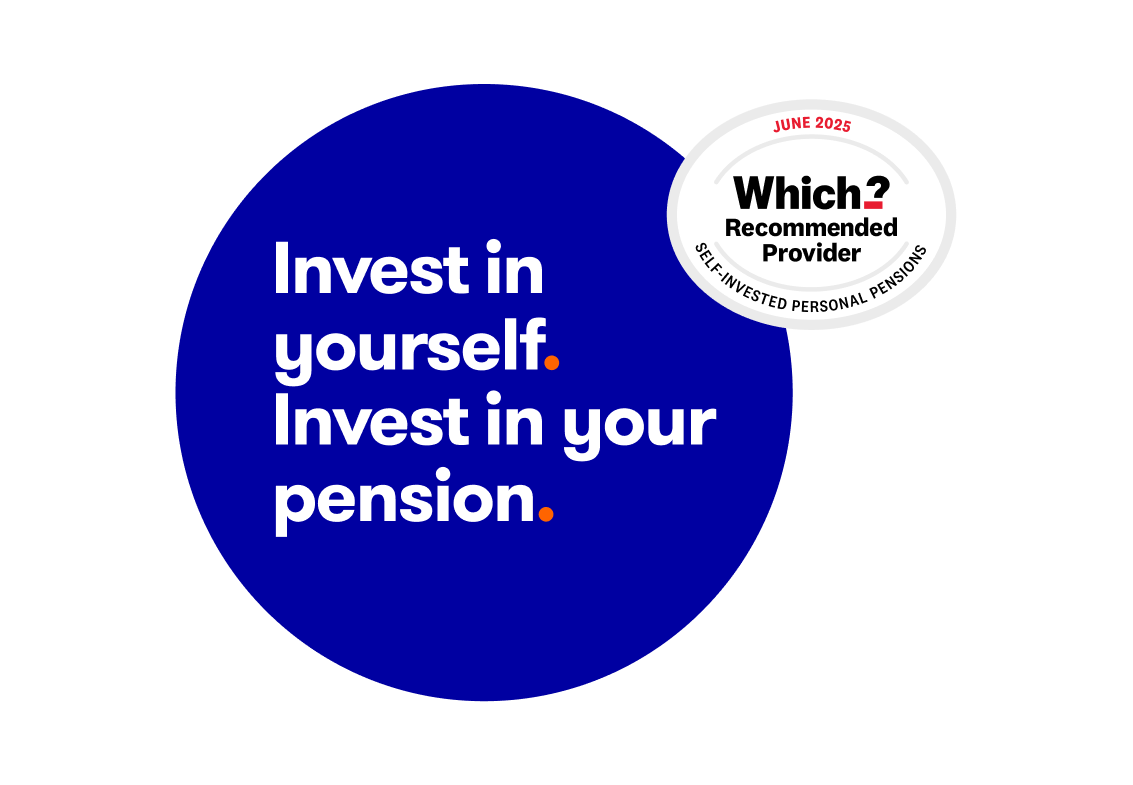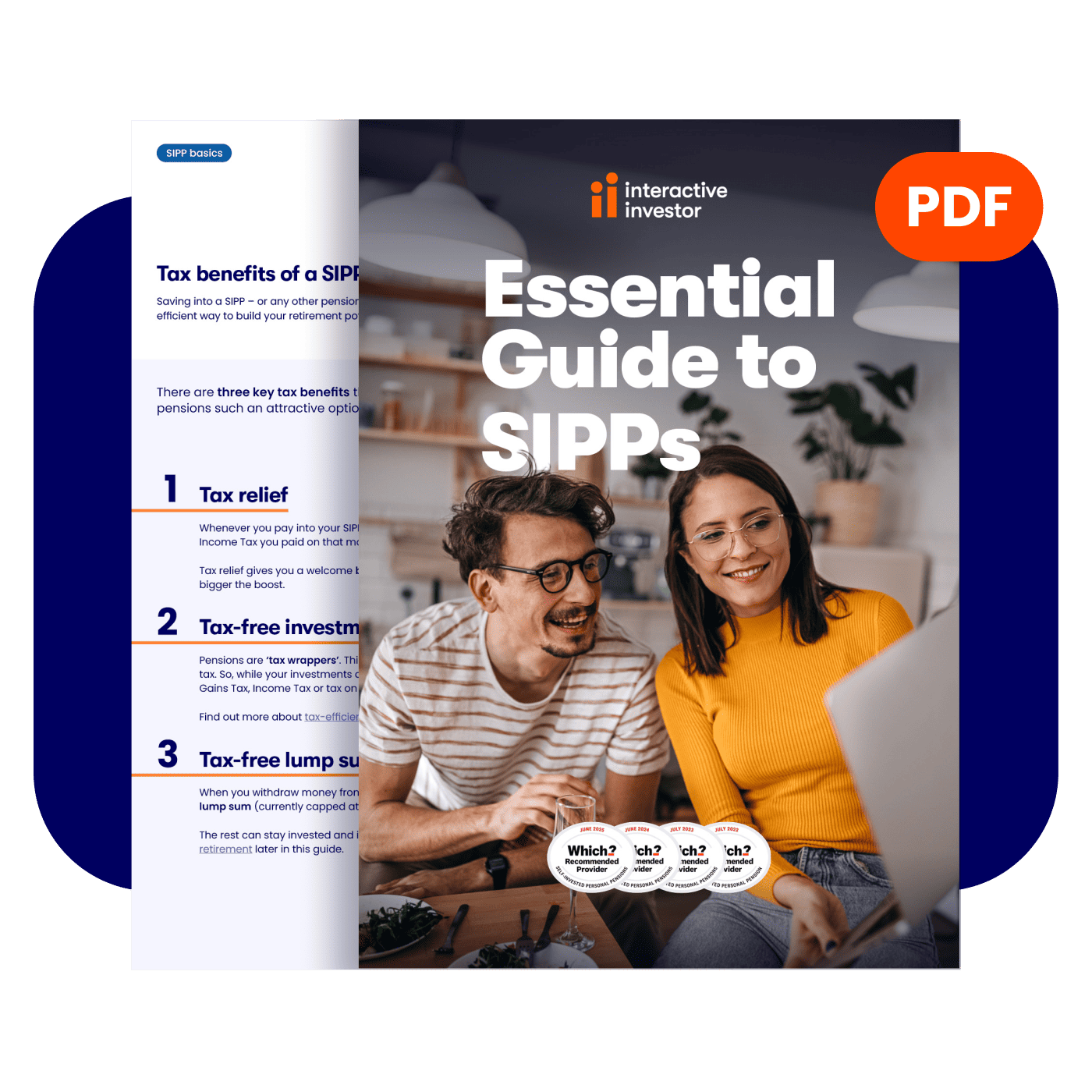ii SIPP
Important information: The ii SIPP is for people who want to make their own decisions when investing for retirement. As investment values can go down as well as up, you may end up with a retirement fund that’s worth less than what you invested. Usually, you won’t be able to withdraw your money until age 55 (57 from 2028). Before transferring your pension, check if you’ll be charged any exit fees and make sure you don't lose any valuable benefits such as guaranteed annuity rates, lower protected pension age or matching employer contributions. If you’re unsure about opening a SIPP or transferring your pension(s), please speak to an authorised financial adviser.
What you'll learn in this guide...
- What SIPPs are and how they work
- How a SIPP can help you grow your retirement savings tax-efficiently
- How much you can contribute in a SIPP each tax year
- What your investment and retirement options are with a SIPP
- The advantages of transferring all your existing pensions to a SIPP
What is SIPP?
A Self-Invested Personal Pension (SIPP) is a type of pension that gives you more control over your retirement savings. SIPPs have the same generous tax benefits as other pensions such as tax relief and tax-free growth, but they provide a flexible way to invest for retirement. And, unlike some other pensions, when you’re ready to start taking an income from your SIPP, you'll have a range of retirement income options to choose from. Just keep in mind, withdrawal options will differ for each SIPP provider.

Who can open a SIPP?
Any UK resident aged between 18 and 75 can open and contribute to a SIPP. This applies whether you are self-employed, employed or don’t work at all. In fact, many people use a SIPP to consolidate and transfer older pensions into one. This makes it easier to manage your pension and may reduce the amount of fees you pay.
Some providers offer the option to open a SIPP on behalf of a child (these are called Junior SIPPs).
How does a SIPP work?
Unlike many pensions, SIPPs let you choose what to invest in. You can pick from a wide range of investments or select ready-made options, managed by experts.
How you invest is completely up to you. You can keep it simple by investing in a single investment that covers multiple asset types — also known as multi-asset funds. Or you can build your own portfolio of investments of your choice.
When you open a SIPP, you can start making contributions whenever you like — whether that’s through monthly payments or occasional lump sums. And your SIPP provider will automatically claim 20% tax relief on your behalf — we'll go into this later.
Over time, your pension can benefit from compound growth. This means your returns start generating their own returns, helping your pot grow faster. It’s like a snowball rolling downhill. Just keep in mind, investment growth is not guaranteed so do take some time researching where to invest.
The earliest you can usually start taking money out of your pension is age 55 (57 from 2028). Once you can make withdrawals, a good SIPP provider will give you access to the full range of retirement income options. This flexibility over how you take your income is one of the key benefits of a SIPP.
What are the tax benefits of a SIPP?
SIPPs, just like any other pensions, are the most tax-efficient way of saving for retirement. Here are the tax benefits that they offer:
Tax relief on contributions: When you pay money into your pension, you’ll get tax relief on your contributions. This is a top-up from the government to encourage you to save for retirement. Your provider will claim basic rate (20%) tax relief for you automatically. For example, if you contribute £80 in your pension, your provider can claim 20% tax relief to top it up to £100.
The tax relief you’re entitled to is equivalent to the rate of income tax you pay. So if you’re a higher or additional rate taxpayer, you’ll also be able to claim back a further 20% or 25% through your Self-Assessment tax return. This means it only costs higher rate taxpayers £60 to put £100 in a pension, and £55 for additional rate taxpayers.
You can get tax relief up until the age of 75. After that, you can still contribute to your SIPP, but you won’t receive tax relief.
Tax-free growth: Investments held in your SIPP will be sheltered from tax as they grow. So there won’t be any UK Dividend, Income or Capital Gains Tax eating into your returns.
Tax-free cash: You can take up to 25% of your SIPP tax-free — either all at once or gradually. The maximum tax-free lump sum you can usually take is currently £268,275, unless you have allowance protections in place — in which case it could be higher.
Contributing to a SIPP
How much can you contribute to a SIPP?
Each tax year, you can contribute 100% of your earnings into your pension, up to a maximum of £60,000. This is known as the annual allowance. There are some situations where your allowance will be lower. For example, if you’ve already made a taxable withdrawal from your pension or are a very high earner.
If you’ve maxed out your allowance for the current year, you may be able to bump up your contributions using the Carry Forward rules. These rules allow you to use any unused allowance from the previous three tax years. This can be particularly helpful if you’re self-employed or your earnings fluctuate.
Even if you don’t earn or pay tax, you can still contribute to a pension and get basic rate tax relief. Each year, you can pay in up to £2,880, which is boosted to £3,600 once tax relief has been added.
How to contribute to a SIPP
Unlike many private or workplace pensions, a SIPP lets you control how much you contribute and when. You can set up regular monthly payments or make lump sum contributions as and when you want.
Most people pay into SIPPs from their personal income. Your employer may also be able to pay into your SIPP, but check if this is possible first, as you don’t want to lose out on any employer contributions.
If you’re self-employed as a limited company director, there may also be tax advantages to making your SIPP contributions from your company accounts — something you can explore further in our SIPPs for the self-employed guide.
Combining your pensions into a SIPP
Like many people over time, you may have built a collection of pensions from different employers over your working life. Managing multiple pensions can be tricky — and could cost you more in pension fees.
With a SIPP, you can bring together other private and workplace pensions into one pot. Doing so can help make it easier to manage and track your pension.
If you decide to move your pension to a SIPP, do check with your existing provider if there are any exit fees and make sure you won’t lose out on any benefits such as guaranteed annuity rates, lower protected pension age and matching employer contributions.
What can you invest in with a SIPP?
SIPPs give you access to a diverse range of investment options including:
- UK and international shares
- Funds
- ETFs (Exchange-Traded Funds)
- Investment trusts
- Bonds and gilts
Some also offer access to commercial property, REITs and other structured products. The exact options depend on the provider, but these are the most commonly available choices.
Deciding what to invest in can be as simple or complex as you like. But if you’re new to investing — or don’t want to spend time researching options — there’s another option. Many providers offer ideas and ready-made options to simplify your decisions. For example, ii offers lots of expert guidance and recommendations, including:
- Quick-start Funds: Choose from six ready-made investment portfolios offering low-cost access to global stock markets
- ii expert recommendations: Check out our Super 60 list of rated funds, or ACE 40 list for sustainable options
- ii SIPP Selected Growth: An optional low-cost investment that our team of experts has carefully selected to match common goals when investing for retirement
Many ii customers choose investments such as diversified global funds, ETFs, or trusts. If you’d like to explore even more ideas, check out our SIPP investment ideas.
How can Pension Wise help?
If you have a defined contribution pension scheme and are 50 or over, then you can access free, impartial guidance on your pension options by booking a face to face or telephone appointment with Pension Wise, a service from MoneyHelper.
If you are under 50, you can still access free, impartial help and information about your pensions from MoneyHelper.

Taking an income from your SIPP
You can usually start withdrawing from your SIPP at any time from age 55 (rising to 57 from 2028). You can access your SIPP through a range of retirement options, including:
Tax free cash: You can take up to 25% of your pension as a tax-free lump sum, subject to a maximum of £268,275 unless you have protection in place, even if you don't plan to take the rest until later.
Income drawdown: Also known as flexi-access drawdown. With this option, you take a tax-free lump sum of up to 25%, subject to a maximum of £268,275, and set up regular or one-off taxable payments for the rest.
Uncrystallised Funds Pension Lump Sum (UFPLS): Take your pension in lump sums, as and when you need them. The first 25% of each lump sum is tax-free, subject to a maximum of £268,275, and the rest is taxed as income. The funds you don't withdraw are left invested.
Annuity: Get a guaranteed income in return for some or all of your pension pot. Annuities offer security, but they're not as flexible as other options. Depending on your circumstances, you may get less back overall.
A combination of the above: Some people choose to use more than one option. For example, you could take a small annuity and the rest of your pension as drawdown. This might give you a good balance of security and flexibility.
Once you have made a taxable withdrawal from your pension, your annual pension allowance will reduce to £10,000 a year. This is known as the Money Purchase Annual Allowance (MPAA).
So it's worth considering the tax implications before accessing your SIPP — especially if you’re still working.
Other considerations:
You don’t have to make decisions straightaway or take your whole pension at once
Any income beyond your tax-free cash is taxable
If you’re able to leave your money invested longer, it may benefit from further growth. The sooner you start making withdrawals, the longer your SIPP will need to last
Is a SIPP right for you?
SIPPs are a great option for anyone who wants more flexibility and control over their pension savings. They can be especially useful for the self-employed or for those without access to a workplace pension. They’re also a good way to top up existing pension savings with a pot that you manage yourself.
Another situation where a SIPP can be useful is if you want to combine multiple pensions into one. This can make it easier — and possibly cheaper — to manage your retirement savings. However, before transferring other pensions into a SIPP, it’s important to check whether you’d be giving up any valuable benefits, such as guaranteed annuity rates, employer contributions and protected pension retirement age.
That said, SIPPs aren’t right for everyone. Before opening one, you’ll need to be sure you're comfortable making your own investment decisions, and that you can afford to lock away your money until at least age 55 (rising to 57 from 2028).

